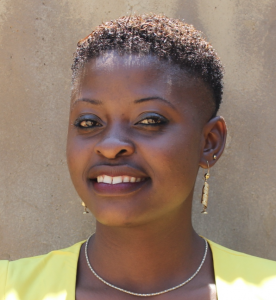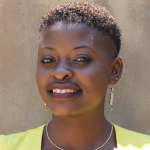The 2,282 people living in the Kakamega Central Police Station barracks struggle to access sufficient water. Though they live in permanent homes and water can be piped into their apartments, it is rationed, incredibly costly, and often cloudy.

Field Officer Jemmimah Khasoha shared, "There's a case reported of a police officer who stays alone, and most of the time, he's on duty and rarely stays in the house and was served with a bill of 6,000 Kenyan Shillings (almost forty dollars). This was painful, and he requested the water line to be disconnected and resorted to buying water on a daily basis." In the photo below, you can see community members purchasing water from a water vendor, someone who carts water in from outside unknown sources to sell.

Sadly, this is not an uncommon occurrence. The officers work hard to serve their community, but that work can often be put on the back burner because of the daily water crisis they face.

Regional Police Commander Paul Kiprono Langat, 58, shown below, shared," Water is the most expensive commodity. When you do not prepare for it, you suffer financially. I can say our work has been affected because, at times, you want to send officers [out] on duty, and some have been reported to be away waiting for water. My officers have been having peace and ample time in serving the public until the stress of having insufficient safe and clean [water] for their use cropped in. These officers can work well and have enough time to attend to the public if they get this precious commodity."

"The other negative challenge of not having water in this premises is that the hygiene and sanitation of the environment is at risk. It is impossible to clean the dog unit, which requires, on average, 250 liters of water per day. This is used to maintain the dogs and their hygiene, wash utensils, and provide them clean water for drinking," continued Jemmimah.
"The water challenge has affected me financially and [affected] my [health]," added 19-year-old Nyline Kerubo, seen below in her kitchen.

Residents like Nyline buy water from a vendor, but unfortunately, that decision comes with the serious risk of contracting water-related illnesses, also costing them their health.
"The reported health challenges include typhoid, diarrhea, and stomach pains, especially among children," concluded Jemmimah.
The installation of the well will enable Paul and the other officers to focus on their patrols and training, making their community safer instead of being distracted by the water crisis. Others like Nyline will spare their finances and health, allowing them to invest in their well-being instead.
Note: Our proposed water point can only serve 300 people per day. We hope to continue working with this community to identify other water solutions that will ensure all of the people in this community have access to safe and reliable drinking water.
The Proposed Solution, Determined Together...
At The Water Project, everyone has a part in conversations and solutions. We operate in transparency, believing it benefits everyone. We expect reliability from one another as well as our water solutions. Everyone involved makes this possible through hard work and dedication.
In a joint discovery process, community members determine their most advantageous water solution alongside our technical experts. Read more specifics about this solution on the What We're Building tab of this project page. Then, community members lend their support by collecting needed construction materials (sometimes for months ahead of time!), providing labor alongside our artisans, sheltering and feeding the builders, and supplying additional resources.
Water Access for Everyone
This water project is one piece in a large puzzle. In Kenya, Sierra Leone, and Uganda, we're working toward complete coverage of reliable, maintained water sources that guarantee public access now and in the future within a 30-minute round trip for each community, household, school, and health center. One day, we hope to report that this has been achieved!
Training on Health, Hygiene & More
With the community's input, we've identified topics where training will increase positive health outcomes at personal, household, and community levels. We'll coordinate with them to find the best training date. Some examples of what we train communities on are:
- Improved hygiene, health, and sanitation habits
- Safe water handling, storage & treatment
- Disease prevention and proper handwashing
- Income-generation
- Community leadership, governance, & election of a water committee
- Operation and maintenance of the water point

 Borehole Well and Hand Pump
Borehole Well and Hand Pump
 Rehabilitation Project
Rehabilitation Project

























